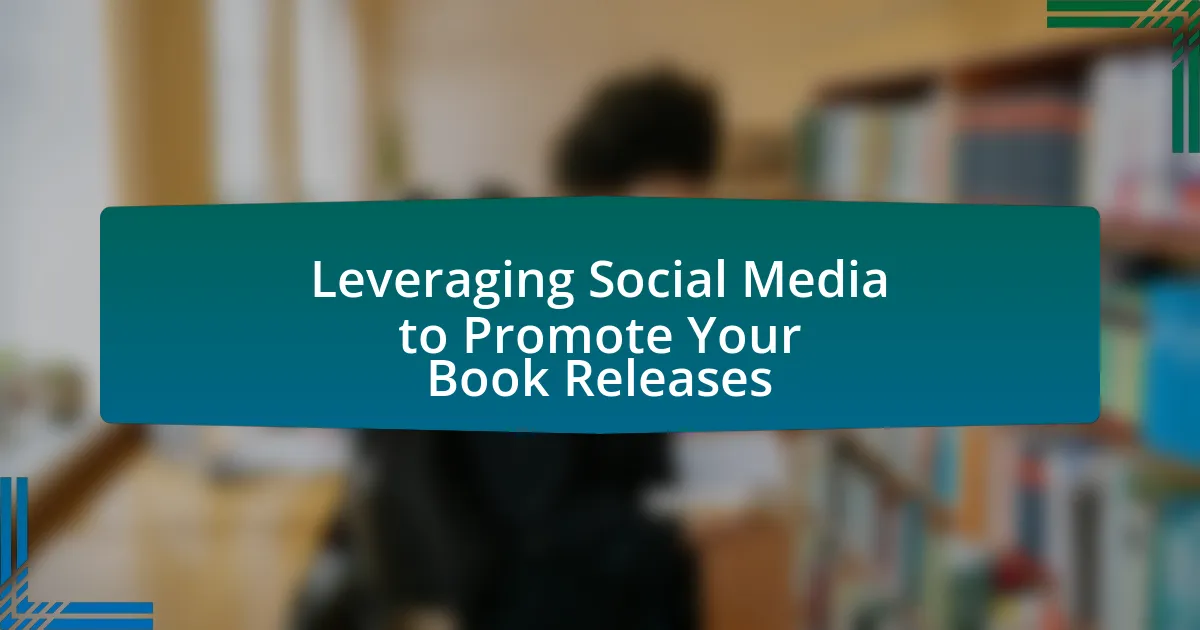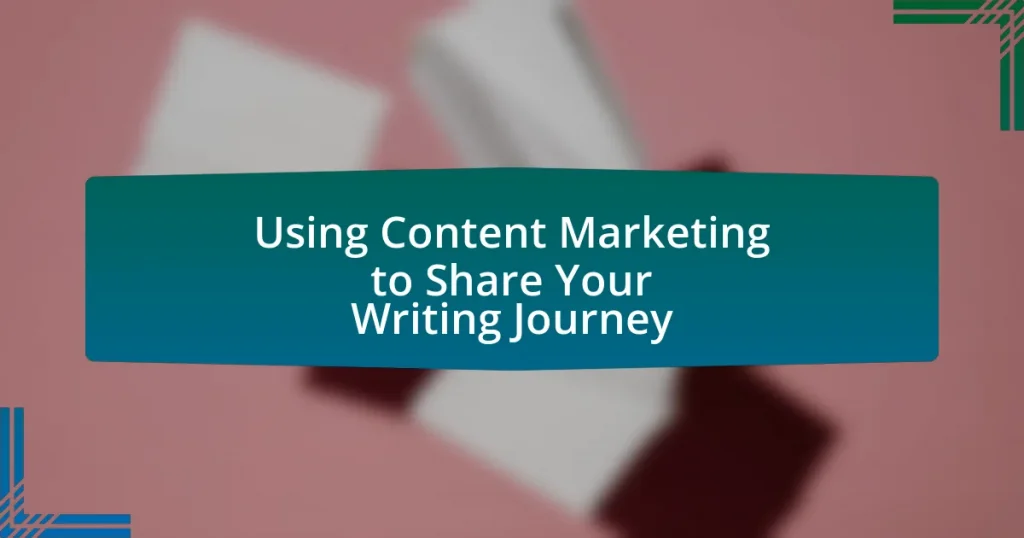Leveraging social media to promote book releases is a strategic approach that utilizes platforms such as Facebook, Twitter, Instagram, and TikTok to engage potential readers and generate excitement around new titles. The article outlines effective methods for authors and publishers, including creating engaging content, utilizing targeted ads, and fostering community through interactive posts. It highlights the importance of understanding audience demographics and preferences, as well as the advantages of social media over traditional marketing methods. Additionally, the article discusses best practices for maintaining authenticity, measuring success through key performance indicators, and avoiding common pitfalls in social media promotions.

What is Leveraging Social Media to Promote Your Book Releases?
Leveraging social media to promote book releases involves utilizing platforms like Facebook, Twitter, Instagram, and TikTok to engage potential readers and create buzz around a new book. Authors and publishers can share teasers, cover reveals, and behind-the-scenes content to build anticipation. According to a 2021 survey by the Book Industry Study Group, 70% of readers discover new books through social media, highlighting its effectiveness as a promotional tool. Engaging with followers through interactive posts, live readings, and Q&A sessions can further enhance visibility and foster a community around the book.
How can social media be utilized effectively for book promotion?
Social media can be utilized effectively for book promotion by creating engaging content that resonates with the target audience. Authors and publishers should share excerpts, behind-the-scenes insights, and visually appealing graphics related to the book to attract attention. According to a survey by the Pew Research Center, 69% of adults in the U.S. use social media, making it a powerful platform for reaching potential readers. Additionally, leveraging targeted ads on platforms like Facebook and Instagram can increase visibility, as these platforms allow for demographic targeting based on interests and behaviors. Engaging with followers through comments and live sessions can also foster a community around the book, enhancing reader loyalty and interest.
What platforms are most effective for promoting book releases?
Social media platforms such as Facebook, Instagram, Twitter, and TikTok are most effective for promoting book releases. These platforms provide extensive reach and engagement opportunities, allowing authors to connect directly with their target audience. For instance, Facebook’s advertising tools enable targeted promotions to specific demographics, while Instagram’s visual content can showcase book covers and engage readers through stories and reels. Twitter facilitates real-time interactions and updates, and TikTok’s viral trends can create significant buzz around new releases, as evidenced by the #BookTok phenomenon, which has driven sales for numerous titles.
How do different audiences engage with various social media platforms?
Different audiences engage with various social media platforms based on their demographics, interests, and content preferences. For instance, younger audiences, particularly those aged 18-29, predominantly use platforms like Instagram and TikTok for visual content and short videos, while older demographics, such as those aged 30-49, are more active on Facebook for community engagement and news sharing. According to the Pew Research Center, 71% of adults aged 18-29 use Instagram, compared to 50% of adults aged 30-49, highlighting the distinct engagement patterns across age groups. Additionally, niche audiences may gravitate towards platforms like Goodreads for book discussions and recommendations, demonstrating how specific interests can dictate platform choice.
Why is social media important for authors and publishers?
Social media is important for authors and publishers because it provides a platform for direct engagement with readers and potential audiences. This engagement allows authors to build a personal brand, share updates about their work, and foster a community around their books. According to a survey by the Pew Research Center, 69% of adults in the U.S. use social media, making it a vital channel for reaching a large audience. Additionally, social media facilitates targeted marketing strategies, enabling authors and publishers to promote their releases effectively to specific demographics, which can lead to increased book sales and visibility in a competitive market.
What advantages does social media offer over traditional marketing methods?
Social media offers several advantages over traditional marketing methods, primarily through its ability to reach a larger audience at a lower cost. Unlike traditional marketing, which often relies on print, television, or radio ads that can be expensive and limited in reach, social media platforms allow for targeted advertising and organic reach to millions of users globally. For instance, a study by HubSpot found that social media marketing costs 62% less than traditional marketing methods while generating approximately three times as many leads. Additionally, social media enables real-time engagement and interaction with audiences, fostering community and loyalty, which traditional methods cannot replicate effectively.
How does social media enhance author-reader interaction?
Social media enhances author-reader interaction by providing direct communication channels that facilitate engagement and feedback. Authors can share updates, respond to reader inquiries, and participate in discussions, creating a sense of community. For instance, platforms like Twitter and Instagram allow authors to post real-time updates about their work, fostering a more personal connection with readers. Research indicates that 70% of readers feel more connected to authors who actively engage with them on social media, demonstrating the effectiveness of these platforms in building relationships.
What strategies can authors use to leverage social media for book releases?
Authors can leverage social media for book releases by creating targeted marketing campaigns that engage their audience. They can utilize platforms like Facebook, Instagram, and Twitter to share teasers, cover reveals, and countdowns to build anticipation. Engaging with followers through polls, Q&A sessions, and live readings can foster community and excitement around the release. Additionally, authors can collaborate with influencers and book bloggers to reach wider audiences, as studies show that 49% of consumers rely on influencer recommendations for purchasing decisions. Using hashtags relevant to the book genre can also enhance visibility, as posts with at least one hashtag receive 12.6% more engagement than those without.
How can authors create engaging content for their book promotions?
Authors can create engaging content for their book promotions by utilizing storytelling techniques that resonate with their target audience. By sharing personal anecdotes, behind-the-scenes insights, or character backstories, authors can forge a deeper connection with potential readers. Research indicates that storytelling can increase audience engagement by up to 300%, as it evokes emotions and fosters relatability. Additionally, incorporating visually appealing graphics, interactive polls, and video content on social media platforms can enhance engagement, as posts with images receive 94% more views than text-only posts.
What role do hashtags play in increasing visibility on social media?
Hashtags significantly enhance visibility on social media by categorizing content and making it discoverable to a broader audience. When users search for or click on a hashtag, they are directed to a feed of posts that include that specific tag, increasing the likelihood of engagement from users who are interested in that topic. For instance, a study by TrackMaven found that tweets with hashtags receive 2 times more engagement than those without. This demonstrates that incorporating relevant hashtags can effectively connect posts to targeted audiences, thereby amplifying reach and interaction.
How can authors measure the success of their social media promotions?
Authors can measure the success of their social media promotions by analyzing key performance indicators (KPIs) such as engagement rates, reach, and conversion rates. Engagement rates, which include likes, shares, and comments, indicate how well the audience interacts with the content. Reach measures the number of unique users who see the posts, providing insight into the promotional visibility. Conversion rates track the percentage of users who take a desired action, such as purchasing a book after seeing a promotion. According to a study by HubSpot, posts with higher engagement rates can lead to a 20% increase in conversion, demonstrating the importance of these metrics in evaluating promotional effectiveness.
What metrics should authors track to evaluate their social media impact?
Authors should track engagement metrics, reach, follower growth, and conversion rates to evaluate their social media impact. Engagement metrics, such as likes, shares, and comments, indicate how well content resonates with the audience. Reach measures the total number of unique users who see posts, providing insight into visibility. Follower growth reflects the expanding audience base, essential for long-term influence. Conversion rates, which track actions taken by users (like visiting a website or purchasing a book), demonstrate the effectiveness of social media efforts in driving desired outcomes. These metrics collectively provide a comprehensive view of an author’s social media performance and its impact on book promotion.
How can feedback from social media inform future marketing strategies?
Feedback from social media can inform future marketing strategies by providing real-time insights into audience preferences and engagement levels. Analyzing comments, shares, and likes allows marketers to identify which content resonates most with their target demographic, enabling them to tailor future campaigns accordingly. For instance, a study by Sprout Social found that 70% of consumers are more likely to purchase from brands that respond to their social media feedback, highlighting the importance of engagement in shaping marketing approaches. By leveraging this feedback, marketers can refine their messaging, optimize content formats, and enhance overall customer satisfaction, ultimately driving better results in future campaigns.
What are common pitfalls to avoid when promoting books on social media?
Common pitfalls to avoid when promoting books on social media include over-promotion, neglecting audience engagement, and failing to tailor content to specific platforms. Over-promotion can alienate potential readers; studies show that excessive self-promotion leads to decreased follower engagement. Neglecting audience engagement results in missed opportunities for building relationships; research indicates that brands that interact with their audience see a 20-40% increase in customer loyalty. Lastly, failing to tailor content to specific platforms can diminish effectiveness; for instance, visual content performs better on Instagram, while longer text posts are more suitable for Facebook.
How can authors ensure they maintain authenticity while promoting their work?
Authors can maintain authenticity while promoting their work by staying true to their voice and values in all communications. This involves sharing personal stories, insights, and experiences related to their writing process, which fosters a genuine connection with their audience. Research indicates that authentic engagement can lead to higher trust and loyalty among readers, as evidenced by a study from the Journal of Marketing Research, which found that consumers are more likely to engage with brands that exhibit authenticity. By consistently reflecting their unique perspective and being transparent about their journey, authors can effectively promote their work without compromising their authenticity.
What mistakes do authors often make that hinder their social media success?
Authors often hinder their social media success by failing to engage authentically with their audience. This lack of genuine interaction can lead to decreased follower loyalty and engagement rates. For instance, a study by the Content Marketing Institute found that brands that prioritize engagement see a 6x higher conversion rate compared to those that do not. Additionally, authors frequently make the mistake of focusing solely on self-promotion rather than providing value, which can alienate potential readers. According to a survey by HubSpot, 60% of consumers feel that brands should focus on creating helpful content rather than just promoting products. These mistakes collectively undermine an author’s ability to build a strong online presence and connect with their target audience effectively.
How can authors create a cohesive social media strategy for their book releases?
Authors can create a cohesive social media strategy for their book releases by establishing clear goals, identifying their target audience, and maintaining consistent messaging across platforms. Setting specific objectives, such as increasing engagement or driving pre-orders, helps authors focus their efforts. Understanding the demographics and preferences of their audience allows for tailored content that resonates. Consistency in branding, tone, and visuals across social media channels reinforces recognition and builds a unified presence. Research indicates that cohesive branding can increase customer recognition by up to 80%, highlighting the importance of a unified approach.
What elements should be included in a comprehensive social media plan?
A comprehensive social media plan should include the following elements: clear objectives, target audience identification, content strategy, platform selection, posting schedule, engagement tactics, analytics and measurement, and budget allocation.
Clear objectives define what the plan aims to achieve, such as increasing book sales or building an author brand. Identifying the target audience ensures that content resonates with the right readers, enhancing engagement. A content strategy outlines the types of posts, such as promotional materials, behind-the-scenes insights, or reader interactions, tailored to the audience’s interests.
Platform selection involves choosing the most effective social media channels, like Facebook, Instagram, or Twitter, based on where the target audience is most active. A posting schedule establishes consistency, which is crucial for maintaining audience interest and engagement. Engagement tactics, such as responding to comments and hosting giveaways, foster community and loyalty among followers.
Analytics and measurement are essential for assessing the effectiveness of the plan, allowing for adjustments based on performance data. Finally, budget allocation ensures that resources are effectively distributed across various activities, such as paid promotions or content creation. Each of these elements contributes to a well-rounded approach to leveraging social media for book promotion.
How can authors align their social media efforts with their overall marketing goals?
Authors can align their social media efforts with their overall marketing goals by establishing clear objectives that reflect their brand and target audience. For instance, if an author’s goal is to increase book sales, they should create engaging content that highlights their books, shares reader testimonials, and promotes special offers. Research indicates that 73% of marketers believe that their efforts through social media marketing have been “somewhat effective” or “very effective” for their business (Buffer, 2021). By analyzing engagement metrics and adjusting their strategies accordingly, authors can ensure that their social media activities directly support their marketing objectives, ultimately driving book visibility and sales.
What are some best practices for engaging with readers on social media?
To effectively engage with readers on social media, authors should prioritize authentic interactions, respond promptly to comments, and share valuable content. Authentic interactions foster trust and connection, as readers appreciate genuine communication from authors. Prompt responses to comments and messages demonstrate that authors value their readers’ input, enhancing engagement. Sharing valuable content, such as behind-the-scenes insights or writing tips, keeps readers interested and encourages them to participate in discussions. According to a study by Sprout Social, 70% of consumers feel more connected to brands that engage with them on social media, highlighting the importance of these practices in building a loyal readership.
How can authors foster a community around their books on social media?
Authors can foster a community around their books on social media by actively engaging with their audience through regular interactions, sharing behind-the-scenes content, and encouraging discussions. Engaging with readers through comments, direct messages, and live Q&A sessions creates a sense of connection and belonging. Sharing exclusive content, such as writing processes or character insights, invites readers into the author’s world, enhancing their investment in the book. Additionally, creating themed hashtags or book clubs encourages readers to share their thoughts and experiences, further solidifying the community. Research indicates that authors who maintain consistent and authentic communication on platforms like Instagram and Twitter see increased reader loyalty and community engagement, as evidenced by a 2021 study from the University of Southern California, which found that 70% of readers prefer to interact with authors who are approachable and responsive on social media.
What types of content resonate most with readers on social media?
Visual content, particularly images and videos, resonates most with readers on social media. Research indicates that posts with visuals receive 94% more views than those without, highlighting the effectiveness of eye-catching graphics and engaging video clips. Additionally, storytelling content, such as personal anecdotes or behind-the-scenes glimpses, fosters emotional connections and encourages sharing, making it highly effective for audience engagement. According to a study by BuzzSumo, articles that include storytelling elements are shared 22 times more than those that do not.
What tips can authors follow to maximize their social media presence during book launches?
Authors can maximize their social media presence during book launches by creating a strategic content plan that includes engaging posts, interactive sessions, and targeted advertising. Engaging posts should highlight key themes, quotes, and visuals from the book to attract attention and encourage shares. Interactive sessions, such as live Q&As or virtual book readings, foster direct engagement with readers, enhancing community building. Targeted advertising on platforms like Facebook and Instagram can reach specific demographics, increasing visibility among potential readers. According to a study by the Pew Research Center, 69% of adults in the U.S. use social media, making it a vital tool for authors to connect with their audience effectively.



